Module 1 Unit 3复习讲义
Module1Unit3教案
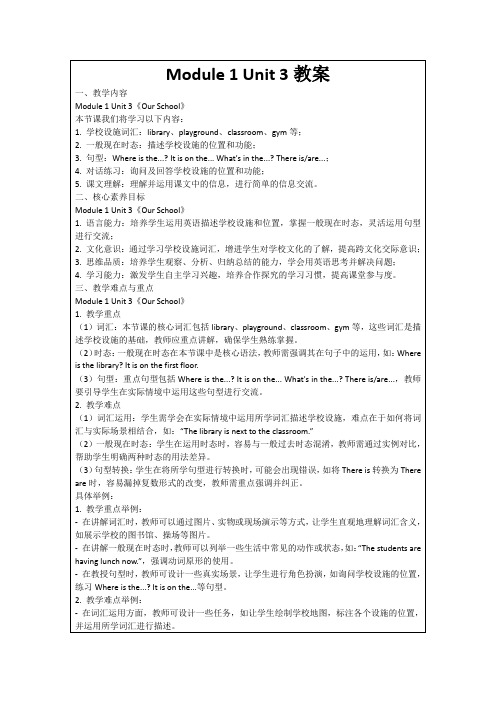
在今天Module 1 Unit 3《Our School》的教学过程中,我发现学生们对于用英语描述学校设施这一主题非常感兴趣,课堂参与度很高。他们积极投入到小组讨论和角色扮演活动中,这让我感到很欣慰。
在讲授新课的过程中,我注意到学生在掌握一般现在时态和词汇运用方面存在一些问题。有些学生在描述学校设施时,容易混淆时态,把一般现在时态和一般过去时态混为一谈。针对这个问题,我通过举例和对比,帮助学生明确了两种时态的用法差异,并在实践活动中加强了对一般现在时态的训练。
(3)句型转换:学生在将所学句型进行转换时,可能会出现错误,如将There is转换为There are时,容易漏掉复数形式的改变,教师需重点强调并纠正。
具体举例:
1.教学重点举例:
-在讲解词汇时,教师可以通过图片、实物或现场演示等方式,让学生直观地理解词汇含义,如展示学校的图书馆、操场等图片。
-在讲解一般现在时态时,教师可以列举一些生活中常见的动作或状态,如:“The students are having lunch now.”,强调动词原形的使用。
此外,我发现学生们在词汇运用方面也有待提高。有些学生在角色扮演时,不能熟练地运用所学词汇描述学校设施。为了解决这个问题,我在课堂上增加了词汇练习环节,让学生们多读、多写、多练习,以提高他们的词汇运用能力。
在学生小组讨论环节,我注意到学生们能够积极发表自己的观点,但在与他人交流时,有时会出现表达不清的情况。针对这个问题,我鼓励学生们多听、多模仿,提高自己的英语口语表达能力。同时,我也在讨论过程中适时给予引导,帮助学生更好地理解问题、分析问题。
实践活动方面,我觉得角色扮演是一个很好的方式,让学生们将所学知识运用到实际情境中。通过这种方式,学生们能够更好地理解和掌握英语描述学校设施的方法。但在活动组织方面,我意识到需要更加注意时间的分配,确保每个小组都有足够的时间进行展示。
Module1 Unit3 课件 共41张PPT

3. Complete the conversation
J: Hi, my name is Jack. What’s your name? I’m L: Hi, Jack. (1) _____Lingling. Where are you from? from are _____ you _____? from J: I’m (2) ______England. (3)Where _____ _____ How ______ old are you? L: I’m from China. (4) ______ J: I’m thirteen. How old are you? L: I’m (5)thirteen _____ too. I’m in Class (6) ______ four Grade 7.What about you? J: I’m in Class 3. Nice to meet you. L: Nice to meet you, too.
Is Xu Kexin from England? 3. -- ______ isn’t She ______ -- No, she ______. is from China __________. 4. -- _______Xu Kexin in Class 3? Is she is -- Yes,_______ _______.
2. Look at the pictures and complete the sentences.
is _______ twelve years Sam Sam __ 1.This is _____. is old and heis __ from England _______. He __ in Class 1. is Emma. Emma ____ is 2. This _____ not is from ___from England. She __ is thirteen years old ________. She ____ America and she is ____ in Class 4.
Module 1 Unit3 Words 讲解(19PPT)

recovery N.
make a recovery from… 从……恢复过来
5. failure n. [U]
a. the state of being not successful 失败
e.g. Failure is the mother of success.
b. not working correctly 失灵,衰竭
Vi. a. (~ at/on sth.) to do an activity which uses effort esp. as employment (从事,劳动,干活)
work at/on my assignment work for sb/sth. 受雇于 work as…从事某工作
b. (of a plan,machine or moving part) to be active in the proper way, without failing (起作用,奏效;顺利进行,运转)
f : vi. progress in a satisfactory way进展顺利 e.g.The plan worked out very well. Things just didn’t workwork n./Vi. [U] 1) activity which uses effort, not for amusement e.g. All work and no play makes Jack a dull boy.
Unit 3 Looking good, feeling good
New words
1. work out
a. to take exercise (=exercise Vi.) 锻炼身体,做运动 e.g. I would work out in the gym after work when I stayed in Nanjing. b. to calculate the answer to (=figure out) 算出,计算 e.g. work out the answer c. to think of a solution to a problem (=figure out) 想出 e.g. It took me some time to work out/figure out how the accident happened.
Module 1 Unit 3 第3课时优质课件

They will be ...
robots
study online
Recite the passage
find books in
under the sea
Place
in space the library
on high
mountains
Robots
use computers
have lessons with students
will play games together. 4. I _d_i_d_n_’t__d_o_(not do)my homework yesterday.
Summary
m → milk mouse room cream
/m/
n → night find win in
/n/
ng → sing ring
Module 1 Changes and differences
Our school in the future
Period 3
Review
校长
时光盒子
来自其他国 家的学生
在太空
一张纸 种植植物 在海底
恐龙
在未来
tekhnologic
拿;携带 线上学习
野餐
What will schools be like in the future? Talk about this with your classmates.
S2: I’d like to ... S3: I’d like to ...
a have a swimming pool
S4: I’d like to ...
b have a lot of clubs e have chess and
Module1Module3知识脉络(讲义)教科版(广州)英语三年级上册

广州版小学英语三年级上册Module1-Module3知识脉络Module 1一、知识考点:打招呼、问候用语和见面介绍用语。
二、本模块知识梳理:1. 打招呼、问侯用语:2. 自我介绍或向朋友介绍其他人:3.英语有一词多义的特点,如“and”有“和”、“而”等多种意思,“And you?"是“而你呢?”的意思。
4.“How are you?"一般是熟人见面打招呼的用语,其正规的答语为“I'm fine/OK/very well./All right, thank you. And you?" 第一次见面则为“How do you do?" 答语则为“How do you do?"表示的意思是“你好!”。
5. Mr(先生),Mrs(太太),Miss(小姐、老师)后跟姓,不能只跟名,如:Mr Chen(陈先生),Mrs Webb(韦布太太),Miss White(怀特小姐)。
Mr和Mrs 也可以写成Mr.和Mrs.。
Module 2一、知识考点:人体各部位单词和相关句型;可数名词单数变复数一般规律。
二、知识梳理:1. 英语的名词分为可数名词和不可数名词,而可数名词有单复数之分,单数是指“一”,复数指“二或二以上”。
可数名词的单数变复数,通常在名词后加-s, 例如:eye-eyes, ear-ears, hand-hands, arm-arms, leg-legs. 但也有其他变化,如:children 是child的复数,teeth是tooth 的复数,foot的复数形式则是feet.2. 注意区别I (我)与my (我的);you (你)与your (你的)。
(1)I (我)总是大写形式。
通常作主语,如:I am a boy.(2)my 不能单独存在,后面通常加名词,如:my father my hands.(3)you 可做主语和宾语,如:You are a boy. (主语)I like you. (宾语)(4)your 和my 的用法一样,也不能单独存在,后面通常加名词。
外研版英语九年级上册模块1--Unit-3复习课教案
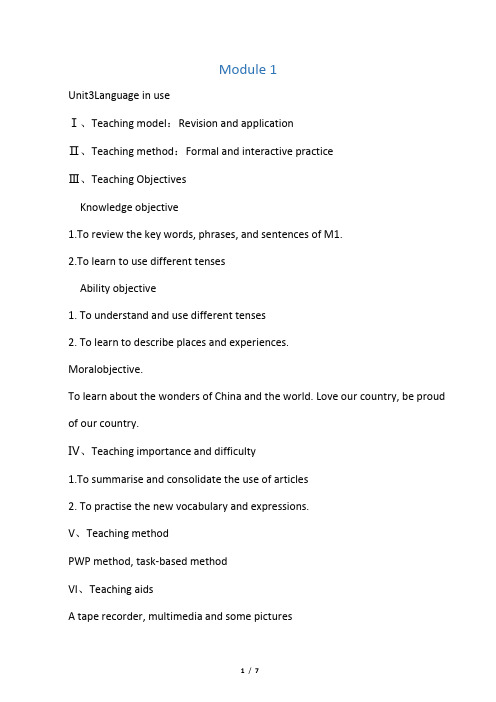
Module 1Unit3Language in useⅠ、Teaching model:Revision and applicationⅡ、Teaching method:Formal and interactive practiceⅢ、Teaching ObjectivesKnowledge objective1.To review the key words, phrases, and sentences of M1.2.To learn to use different tensesAbility objective1. To understand and use different tenses2. To learn to describe places and experiences.Moralobjective.To learn about the wonders of China and the world. Love our country, be proud of our country.Ⅳ、Teaching importance and difficulty1.To summarise and consolidate the use of articles2. To practise the new vocabulary and expressions.V、Teaching methodPWP method, task-based methodVI、Teaching aidsA tape recorder, multimedia and some picturesⅦ、Teaching ProceduresLearning Aims(学习目标)1.To review the key words, phrases, and sentences of M92.To use articles3. To learn to read large numbersStep 1:Review the knowledge(知识回顾)1.师友互查1)Review the phrasesgo through, fall away, on top of, look over, look across, look down,get out of , join in, agree with, man-made, more than, millions of,in one’s opinion2)课文原句在现1. I got out of the car, went through a gate and walked along a dark path.2. I looked over them, but it was silentand there was no sign of it.3. I looked down to the Colorado River4. Finally, I looked to my left and to my right.5. The sun rose behind me and shone ontherocks.Farbelowme,thegroundfell away and down to a river.6. I remained by the canyon for a bout half an hour…7.Let’s callWonder of the Worldand join in the discussion.8.I think the Giant’s Causeway is the most fantastic natural wonder.9. I think Victoria Falls in Africa is even more fantastic.10. But in my opinion, man-made wonders are more exciting than natural ones.(友情提示:师友朗读,理解记忆。
知识点(Module1-3)(知识清单)英语六年级上册
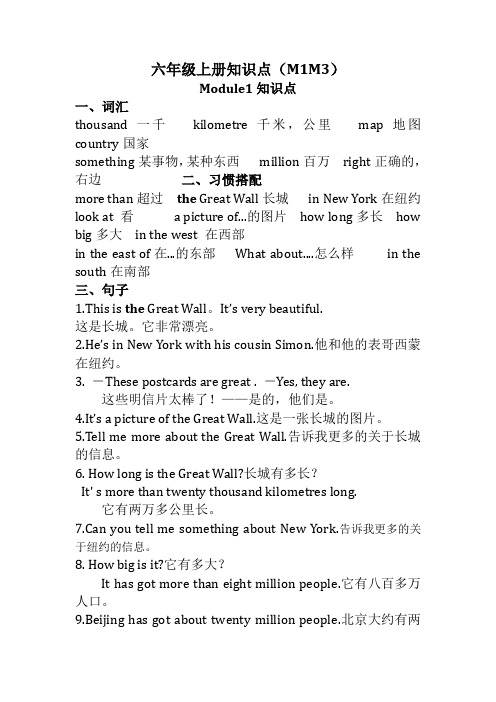
六年级上册知识点(M1M3)Module1知识点一、词汇thousand一千kilometre千米,公里map 地图country国家something某事物,某种东西million百万right正确的,右边二、习惯搭配more than超过the Great Wall长城in New York在纽约look at 看 a picture of...的图片how long多长how big多大in the west 在西部in the east of在...的东部What about....怎么样in the south在南部三、句子1.This is the Great Wall。
It’s very beautiful.这是长城。
它非常漂亮。
2.He’s in New York with his cousin Simon.他和他的表哥西蒙在纽约。
3. -These postcards are great . -Yes, they are.这些明信片太棒了!——是的,他们是。
4.It’s a picture of the Great Wall.这是一张长城的图片。
5.Tell me more about the Great Wall.告诉我更多的关于长城的信息。
6. How long is the Great Wall?长城有多长?It' s more than twenty thousand kilometres long.它有两万多公里长。
7.Can you tell me something about New York.告诉我更多的关于纽约的信息。
8. How big is it?它有多大?It has got more than eight million people.它有八百多万人口。
9.Beijing has got about twenty million people.北京大约有两千万人口。
Module 1 Unit 3 Arhappy_知识点复习(课件)沪教牛津版(深圳用)英语四年级上册

3. ---- How are you ? 你好吗? ---- I'm fine / happy / sad / tired/
hungry / full / thirsty / angry / afraid / surprised ......
6. ---- Is the bird very thirsty?
---- Yes, it is. / No, it isn't.
7. ---- Are they hungry?
---- Yes, they are. / No, they aren't.
8. ---- Are the boys happy? ---- Yes, they are. / No, they aren't.
9. ---- Have some biscuits. ---- Thank you.
10. I want a banana. She wants some cola.
A thirsty bird
It is hot .The bird is very thirsty.
The bird can see a bottle. There is some water in it.
4. ---- Are you happy ? 你高兴吗? ---- Yes, I am. / No, I'm not. Yes, we are, / No, we aren't.
5. ---- Is she / he sad? ---- Yes,she / he is. No, she / he isn't.
外研版初三英语上册Module 1知识点讲义
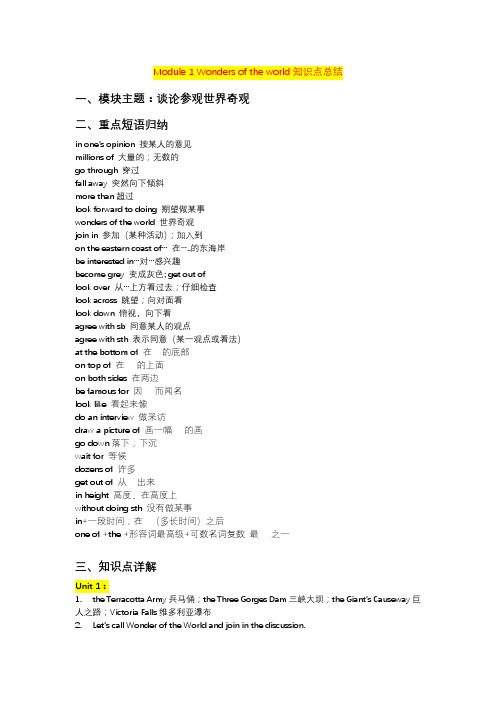
Module 1 Wonders of the world知识点总结一、模块主题:谈论参观世界奇观二、重点短语归纳in one’s opinion 按某人的意见millions of 大量的;无数的go through 穿过fall away 突然向下倾斜more than超过look forward to doing 期望做某事wonders of the world 世界奇观join in 参加(某种活动);加入到on the eastern coast of… 在…..的东海岸be interested in…对…感兴趣become grey 变成灰色; get out oflook over 从…上方看过去;仔细检查look across 眺望;向对面看look down 俯视,向下看agree with sb 同意某人的观点agree with sth 表示同意(某一观点或看法)at the bottom of 在…..的底部on top of 在……的上面on both sides 在两边be famous for 因……而闻名look like 看起来像do an interview 做采访draw a picture of 画一幅……的画go down落下;下沉wait for 等候dozens of 许多get out of 从…..出来in height 高度,在高度上without doing sth 没有做某事in+一段时间;在….(多长时间)之后one of +the +形容词最高级+可数名词复数最……之一三、知识点详解Unit 1:1. the Terracotta Army兵马俑;the Three Gorges Dam三峡大坝;the Giant’s Causeway巨人之路;Victoria Falls维多利亚瀑布2. Let’s call Wonder of the World and join in the discussion.(1) let的用法:让:let sb. (not) do sth. 出租:Room to let, laundry found. 房间出租, 洗衣不另收费.(2) wonder v.“想知道;对…感到好奇”。
牛津英语五年级上册知识点整理
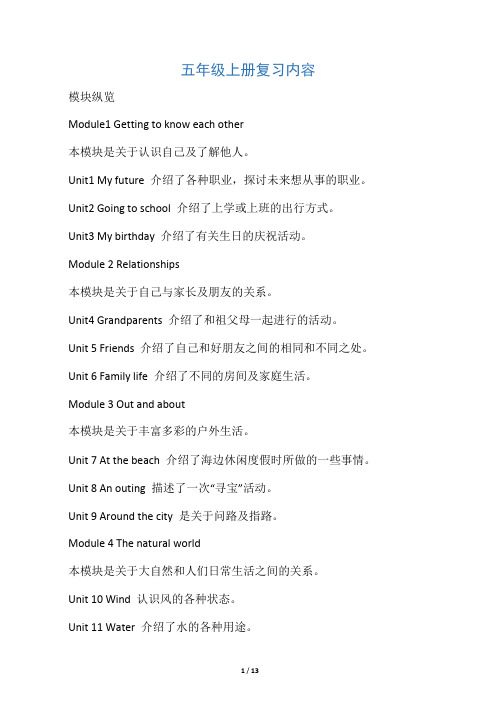
五年级上册复习内容模块纵览Module1 Getting to know each other本模块是关于认识自己及了解他人。
Unit1 My future 介绍了各种职业,探讨未来想从事的职业。
Unit2 Going to school 介绍了上学或上班的出行方式。
Unit3 My birthday 介绍了有关生日的庆祝活动。
Module 2 Relationships本模块是关于自己与家长及朋友的关系。
Unit4 Grandparents 介绍了和祖父母一起进行的活动。
Unit 5 Friends 介绍了自己和好朋友之间的相同和不同之处。
Unit 6 Family life 介绍了不同的房间及家庭生活。
Module 3 Out and about本模块是关于丰富多彩的户外生活。
Unit 7 At the beach 介绍了海边休闲度假时所做的一些事情。
Unit 8 An outing 描述了一次“寻宝”活动。
Unit 9 Around the city 是关于问路及指路。
Module 4 The natural world本模块是关于大自然和人们日常生活之间的关系。
Unit 10 Wind 认识风的各种状态。
Unit 11 Water 介绍了水的各种用途。
Unit 12 Fire 介绍了一些基本的防火知识。
第一单元复习词组Jump into the lake fly a plane cook nice food(be)afraid of flying help people drive a taxi(be)good at...句型用What do you want to be ?询问对方将来想从事的职业。
用I want to be ...及I want to (do)...介绍自己未来想从事的职业及理由。
难点1)当句子主语为第三人称单数时,动词要做适当的变化。
2)want to do 与want to be 的正确用法。
Module1Unit3课件(18PPT无音视频)

cheese
It doesn’t smell _f_re_s_h__. It smells too __s_tr_o_n_g__. It tastes a bit __s_o_u_r___.
chocolate cookies
apple pie
They taste really s_w__e_e_t .
bananas flowers juice ice cream cake silk T-shirts pop music basketball bird cat hamburger lantern plane grass the sun
A: It can fly. B: Is it a plane? A: No, It isn't. It's very small. B: Is it a bird? A: Yes, you're right.
Homework
Work in groups. Share your description with your classmates. Let them guess who he/she is.
3. The idea ___C_____good. We can try it. A. smells B. tastes C. sounds D. feels
Complete the sentences
1. 这个毛衣摸起来很柔软。 This sweater ____f_ee_l_s__ ___s_o_f_t in use.
Revision——Part 1
1. Sense verbs: feel, look, sound, smell, taste 2. Express feelings and moods with adjectives
Module1Units1-3教案
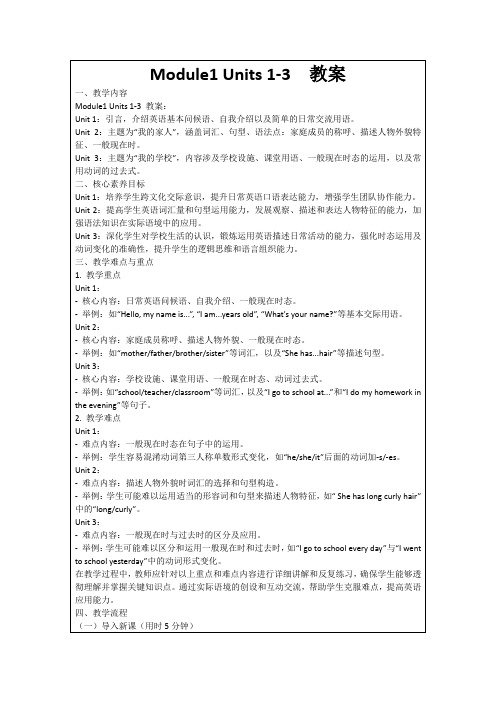
在Module1 Units 1-3的教学过程中,我注意到学生在学习英语问候语、自我介绍、家庭成员称呼以及一般现在时态等方面取得了一定的进步。但同时也暴露出一些问题,值得我去思考和改进。
首先,我发现学生们在口语表达方面还存在一定的障碍。尽管他们能理解并模仿例句,但在实际场景中运用时,仍显得有些紧张和不自信。因此,在今后的教学中,我需要更加注重培养学生的口语表达能力,多组织一些课堂口语练习和角色扮演活动,让他们在实践中不断积累经验,提高自信。
3.成果分享:每个小组将选择一名代表来分享他们的讨论成果。这些成果将被记录在黑板上或投影仪上,以便全班都能看到。
(五)总结回顾(用时5分钟)
今天的学习,我们了解了英语基本问候语、自我介绍、家庭成员称呼、描述人物外貌以及一般现在时态的基本概念和应用。同时,我们也通过实践活动和小组讨论加深了对这些知识点的理解。我希望大家能够掌握这些知识点,并在日常生活中灵活运用。最后,如果有任何疑问或不明白的地方,请随时向我提问。
三、教学难点与重点
1.教学重点
Unit 1:
-核心内容:日常英语问候语、自我介绍、一般现在时态。
-举例:如“Hello, my name is...”, “I am...years old”, “What's your name?”等基本交际用语。
Unit 2:
-核心内容:家庭成员称呼、描述人物外貌、一般现在时态。
二、核心素养目标
Unit 1:培养学生跨文化交际意识,提升日常英语口语表达能力,增强学生团队协作能力。
Unit 2:提高学生英语词汇量和句型运用能力,发展观察、描述和表达人物特征的能力,加强语法知识在实际语境中的应用。
Unit 3:深化学生对学校生活的认识,锻炼运用英语描述日常活动的能力,强化时态运用及动词变化的准确性,提升学生的逻辑思维和语言组织能力。
上海牛津版英语五年级上册Module1Unit3M1U3同步讲义教案
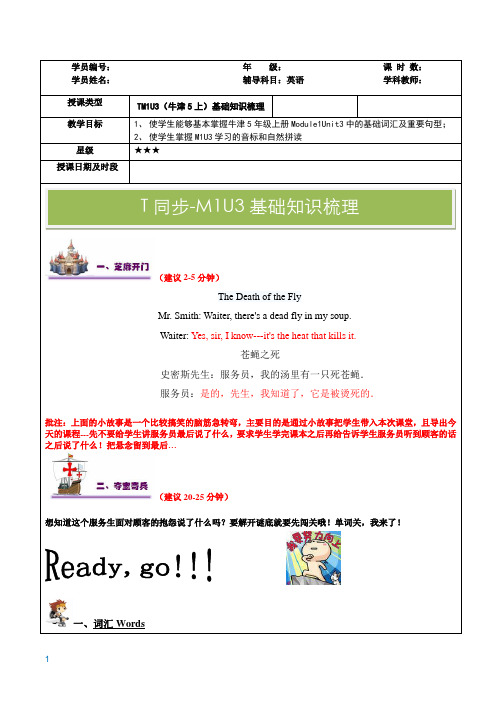
学员编号:年级:课时数:学员姓名:辅导科目:英语学科教师:授课类型TM1U3(牛津5上)基础知识梳理教学目标1、使学生能够基本掌握牛津5年级上册Module1Unit3中的基础词汇及重要句型;2、使学生掌握M1U3学习的音标和自然拼读星级★★★授课日期及时段T同步-M1U3基础知识梳理(建议2-5分钟)The Death of the FlyMr. Smith: Waiter, there's a dead fly in my soup.Waiter: Yes, sir, I know---it's the heat that kills it.苍蝇之死史密斯先生:服务员,我的汤里有一只死苍蝇.服务员:是的,先生,我知道了,它是被烫死的.批注:上面的小故事是一个比较搞笑的脑筋急转弯,主要目的是通过小故事把学生带入本次课堂,且导出今天的课程---先不要给学生讲服务员最后说了什么,要求学生学完课本之后再给告诉学生服务员听到顾客的话之后说了什么!把悬念留到最后…(建议20-25分钟)想知道这个服务生面对顾客的抱怨说了什么吗?要解开谜底就要先闯关哦!单词关,我来了!一、词汇Words1. (be )afraid of 害怕,担忧e.g. But he is afraid of flying. 但是他恐惧飞行。
She is afraid of snakes. 她怕蛇。
He is afraid of going out alone at night. 他害怕夜里一人出门。
【知识拓展】be afraid 表示“害怕的,担忧的”批注:afraid是一个形容词,表示“害怕的,担忧的”。
如果只是表达我很害怕或担忧,而并未明确对象时,只需说I’m afraid. 不需要加of,可通过例句引导学生。
2. dream n. 梦想,梦e.g. What' s your job now and what's your dream job ?你现在的工作是什么,你梦想的工作是什么?3. farmer n . 农民e.g. Lucy’s father is a farmer. 露西的爸爸是一个农民。
牛津版小三英语上(M2U1Myfriends同步知识梳理)

教师辅导讲义辅导科目:英语三年级上Modulel Unit3 同步知识稳固根据教材内容,梳理本单元词汇、句型和语法知识,通过综合练习,提升水平.教学内容1. fat 形容词胖的,肥的[例句]Fred is too fat. He eats too much.弗雷德太胖,他吃得太多了.My friend is very fat .我的朋友很胖.[反义词]thin 瘦的 2. thin 形容词瘦的[例句]The cat is fat, but his brother is very thin. 这只猫很胖,但他的兄弟很瘦.My father is tall and thin .我爸爸又高又瘦.[友情提示]thin 作形容词时除了意为“瘦的〞之外,还可以意为“薄的,细的〞The paper is very thin.这纸非常薄.此时thin 的反义词为thick 〔厚的〕. 3. tall 形容词高的[例句]My English teacher is very tall.My English teacher is very tall 我的英语老师个子很高.[同义词]high 高的 [反义词]short 矮的 4. short 形容词 ⑴矮的[例句]He is short but strong.他个子矮但是结实.Tom is short but his mothers very tall. 汤姆个子矮,但是他妈妈很高.[反义词]fat 胖的 课时数:3教学目的 Unit 3 How old are you?O例如:知识梳理[反义词]tall 高的(2)短的[例句]My hair is short and black.我的头发又黑又短.She likes the short skirt.她喜欢这条短裙.[相关链接]shorts短裤5. boy 名词男孩;小伙子[例句]They have got three children -two boys and a girl.他们有三个孩子,两个男孩一个女孩.Tom is a boy's name.汤姆是个男孩的名字.6. girl 名词(1)女孩[例句]Is the baby a boy or a girl?这个婴儿是男孩还是女孩?(2)女儿[例句]Mary is Mr. Green , s girl.玛丽是格林先生的女儿.7. friend 名词朋友[例句]Helen is my best friend.海伦是我最好的朋友.Jim and Jack are old friends.吉姆和杰克是老朋友.[记忆链接]penfriend笔友friendship友谊II. Sentences 句子1. Look at the boy! 看这个男孩!这是一个祈使句,省略了主语you ,表示建议、要求.100k意为"看"接名词时,后面必须加上介词at.例如:Look at me . 看我.Look at the blackboard , please.请看黑板.[记忆链接]look bad看起来不利于look good看起来充满希望look after照顾look out留神;留神[辨析]look和seelook和see者B有“看〞的意思,前者指“看〞的动作,后者指“看〞的内容,意为“看见〞.例如:Look at the bird.看那只鸟.Can you see me?你能看见我吗?2. He's my friend .他是我的朋友.该句是一个陈述句,用来表达一个事实. He'是He is的省略形式.例如:He is my dad.他是我爸爸.[友情提示]将陈述句中的be动词,提到句首,其他地方稍作改变,就构成了一般疑问句.陈述句中的my在问句中要变为your.即:一般疑问句:Is he your friend?他是你的朋友吗?对一般疑问句,用Yes或No进行答复.即:肯定答复:Yes, he is.否认答复:No, he isn't.3. Who' s your friend , Peter?你的朋友是谁,彼得?该句是一个Wh-question,又叫特殊疑问句. Who s是Who is的省略形式,who和what 一样是疑问代词,意为“谁〞,通常对主语进行提问,用来询问他/她的姓名或与别人的关系.例如:Who is the girl , Peter?彼得,那个女孩是谁?Who is Kate's friend? 谁是凯特的朋友?4. She can sing , but she can't swim. 她会唱歌但是不会游泳.can是情态动词,在句子中不能单独作谓语,只能和其后的动词原形一起构成复合谓语.根本意思是“能;会〞例如:I can sing.我会唱歌.Jim can swim . 吉姆会游泳.can't是can的否认形式,意为“不能,不会" can't是can not的缩写形式,还可以写成cannot.例如:He can swim .他会游泳.He can't swim.他不会游泳.[友情提示]can后面只能接动词的原形.5. Two fat boys in the rain .两个胖男孩在雨中.fat是形容词,意为“胖的〞,放在名词前,起修饰作用,常用来指人或动物是“胖的,肥的〞 .例如:The fat cat is sleeping.那只胖猫在睡觉.The fat girls are swimming. 胖女孩们正在游泳.III. Grammar 语法1. be 动词:is前面我们已经介绍过be动词IS的用法,也学习了当主语为指示代词this,第三人称单数代词it时,be动词应为is的用法.在本单元中,我们将继续学习当主语为第三人称单数代词he/she时,其后be动词用is.例如:在be动词is后直接加not变成否认句,is not可以缩写成isn '.t例如:He is not my brother.他不是我哥哥.She isn ' t my friend不是我的朋友.2. Yes/ No question: Is he/she ?••在前面的单元里, 我们已经接触了Yes/No question〔一般疑问句〕.本单元我们将继续学习Yes/No question 〔一般疑问句〕的用法.课文中Is he/she ?♦♦是一般疑问句.其陈述句为:He/She is…用Yes/ No对其进行答复.例如:- Is he your friend?他是你的朋友吗?- Yes, he is.是的,他是.〔肯定答复〕- No, he isn 不,他不是.〔否认答复〕3. Wh -question 的用法who可引导特殊疑问句,当who作主语时,其构成为:疑问词who 〔主语〕+谓语+其他成分?用来询问对方是谁.例如:Who is your friend? 你的朋友是谁?Who is singing in the room? 谁在房里唱歌?[友情提示](1)答复特殊疑问句时,不能用 Yes/No,即问什么答什么,且常用简略答复.例如:4 .情态动词 cancan 是一个情态动词,表示说话人的语气或情态,没有人称和数的变化,在句子中不能单独作谓语, 着的动词原形一起构成复合谓语.can 的根本意思是能;会〞.本单元中主要介绍了 can 表示水平(如体力和脑力方面),意为能;会〞等时的用法.例 如: Can you speak English?你会讲英语吗? Can you play the piano?你会弹钢琴吗? (1)变为否认句时,只需要在can 后面直接加not,即can not,可以写成can't 或cannot .例如:He can sing.他会唱歌. He can't sing.他不会唱歌. (2)在变一般疑问句时,把can 直接移到主语前(原主语的首字母改成小写,第一人称变为第二人称)即可.例如:I can see an orange on the table.我能看见桌上有个橘子. Can you see an orange on the table?你能看见桌子上有个橘子吗? 嗨上课更有精神!课堂练习、正确书写,注意大小写、标点 is he peterno he isnt he is paul(2)特殊疑问句一般读降调.休息一F、中译英十支钢笔 2.他的朋友们3. 来自我的朋友4.在雨中5. 鞠了又鞠6. 两个小婴儿7. 三位高个老师8. 骑自行车、按要求写单词boy〔复数〕 2. baby (复数) 2. short〔反义词〕fat 〔反义词〕5. pen〔与划线局部发音相同词〕 6. four 〔同类词〕7. swim 〔动名词〕8. is 〔否认形式〕[keys ]一、略二、略三、1. boys 2. babies 3. tall/long 4. thin 5. ten. 6. one. 7. swimming 8. isn't四、l. C 2.D 3. A 4.B 5. C五、1. is, has, can 2. are, have 3. have, are 4. is, is ,isn't 5. can, can't六、l. B 2.C 3. A 4. B 5.B 6. C 7. B 8. C 9. B 10. A嗓^课后作业一、正确书写,注意大小写、标点what can she do she can sing but she cant swim二、译句子1 .看着这个男孩.2 .谁是你的好朋友?3 .我的朋友九岁了.4 .他会踢球足球.三、按要求改写句子1. My friend is Kitty.(划线提问)is friend?2. She is tall and thin.(改为一般疑问句,并作否认答复)tall and thin?, she.3. I can see two babies.(划线提问) babies can you see?4. He can jump very high.(改否认句) He jump very high.5. My friend is eight.(划线提问)is friend?四、阅读理解(I)Yang Xu is my best friend. We are classmates. He is very tall. He likes pop music and sports. He can play football very well. And he is on our school football team ( 队).We like English and Chinese. We study together very day. 读短文,判断正误( )1. Yang Xu is my best classmate.( )2. He isn't short.( )3. He can't play football.( )4. We like English and Chinese.( )5. We play every day.(II)Mike and Tom are in the same school. They are in the same grade, too. Mike has a football. After class, they playfootball together. They like swimming, jumping and riding bicycles. So they are good friends. Are Mike and Tom in the same school?根据短文,答复下列问题1. Are Mike and Tom in the same school?2. What does Mike have?3. What do they do after class?4. What do they like doing?[keys]一、略小朋友,今天课上的内容都学会了吗? 赶紧把重要知识点和自己做错的题目记录 在下面的空白处,以后经常复习复习吧!二、1. Look at this boy.1. Who, your2. 四、(I)1.F 2.T3.F 2. Who is your good friend? 3. My friend is nine years old.4. He can play football.Is she, No, isn't 4.T 5. F 3. How many 4. can not 5. How old, your(II)1. Yes, they are. 2. bicycles.He has a football3. They play football.4. They like swimming, jumping and riding。
Module1Unit3教案
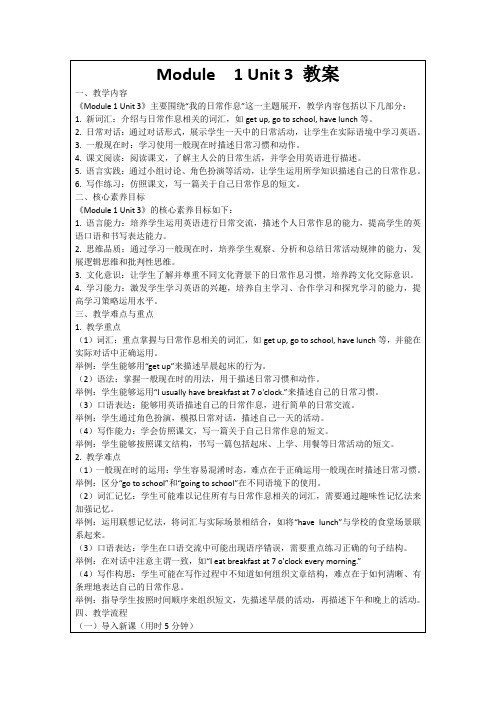
(四)学生小组讨论(用时10分钟)
1.讨论主题:学生将围绕“一般现在时在实际生活中的应用”这一主题展开讨论。他们将被鼓励提出自己的观点和想法,并与其他小组成员进行交流。
2.引导与启发:在讨论过程中,我将作为一个引导者,帮助学生发现问题、分析问题并解决问题。我会提出一些开放性的问题来启发他们的思考。
(3)口语表达:能够用英语描述自己的日常作息,进行简单的日ቤተ መጻሕፍቲ ባይዱ交流。
举例:学生通过角色扮演,模拟日常对话,描述自己一天的活动。
(4)写作能力:学会仿照课文,写一篇关于自己日常作息的短文。
举例:学生能够按照课文结构,书写一篇包括起床、上学、用餐等日常活动的短文。
2.教学难点
(1)一般现在时的运用:学生容易混淆时态,难点在于正确运用一般现在时描述日常习惯。
三、教学难点与重点
1.教学重点
(1)词汇:重点掌握与日常作息相关的词汇,如get up, go to school, have lunch等,并能在实际对话中正确运用。
举例:学生能够用“get up”来描述早晨起床的行为。
(2)语法:掌握一般现在时的用法,用于描述日常习惯和动作。
举例:学生能够运用“I usually have breakfast at 7 o'clock.”来描述自己的日常习惯。
1.语言能力:培养学生运用英语进行日常交流,描述个人日常作息的能力,提高学生的英语口语和书写表达能力。
2.思维品质:通过学习一般现在时,培养学生观察、分析和总结日常活动规律的能力,发展逻辑思维和批判性思维。
3.文化意识:让学生了解并尊重不同文化背景下的日常作息习惯,培养跨文化交际意识。
三升四课本复习第3讲Module3U1U2复习巩固(外研版三起)(教师版)
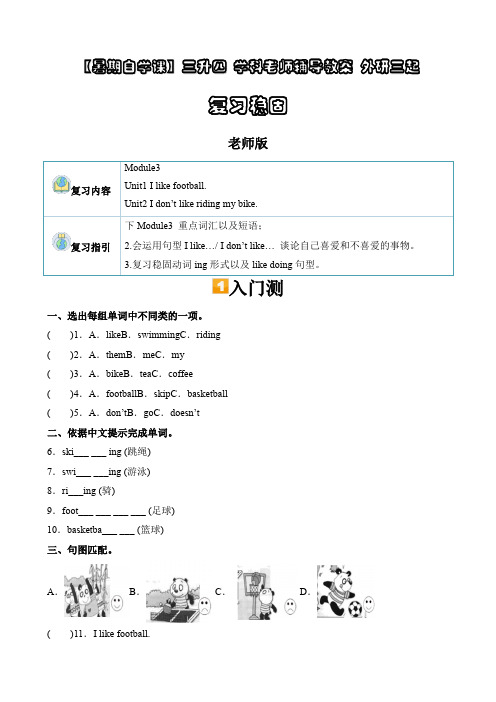
【暑期自学课】三升四学科老师辅导教案外研三起复习稳固老师版复习内容复习指引入门测一、选出每组单词中不同类的一项。
( )1.A.likeB.swimmingC.riding( )2.A.themB.meC.my( )3.A.bikeB.teaC.coffee( )4.A.footballB.skipC.basketball( )5.A.don’tB.goC.doesn’t二、依据中文提示完成单词。
6.ski___ ___ ing (跳绳)7.swi___ ___ing (游泳)8.ri___ing (骑)9.foot___ ___ ___ ___ (足球)10.basketba___ ___ (篮球)三、句图匹配。
A.B.C.D.( )11.I like football.( )12.I don’t like basketball.( )13.I don’t like table tennis.( )14.I like morning exercises.四、英汉互译。
15.skip _________16.茶_________17.ride bikes _________18.swimming _________19.不喜爱_________答案:一、1.A 2.C 3.A 4.B 5.B二、6.p p7.m m8.d9.b a l l10.l l三、11.D 12.C 13.B 14.A四、15.跳16.tea 17.骑自行车18.游泳19.don’t like课文内容回忆Unit1 I like football复习重点单词:like, football, basketball, table tennis。
复习运用句型I like…/ I don’t like…谈论自己喜爱和不喜爱的事物。
把握有关运动的词汇:swimming, skipping, riding bikes。
稳固学过的运动词汇:football, basketball, table tennis , morning exercises。
Module1unit3课件

last year.
A. visited B. were visiting C. have visited D. visit
2. Our physics teacher told us light ___C____ faster than sound.
A. has travelled
B. is travelling
4.现在进行时表将来:
come, go, leave, fly, drive, arrive, return等表示位置移动的动词,表示计 划好在将来要做的事, 可以使用现在进行时表示将来。
e. g. The train bound for Bei jing is arriving. 开往北京的车即将进站。
simple future tense (一般将来时)
present continuous tense (现在进行时)
past continuous tense (过去进行时)
present perfect (现在完成时)
Language practice
Read the following sentence and tell its tense.
④以重读闭音节结尾的动词, 要先双写这一辅音字母再加-ed。
4.常用标志词:yesterday ;last year ;just now ;three days ago; in 1989 等表示过去具体时间的单词或短语。
Exercise
1. Thousands of tourists __A___ Huashan Mountain to relax themselves
e.g. While the rain began beating against the windows heavily, Ben was helping his mom make dinner. 当雨开始猛烈地敲打着窗户时,本正在帮他妈妈做晚饭。 e.g. From 1983 to 1998, he was teaching in Beijing. 从1983 年到1998 年, 他一直在北京教学。
Module1Unit3复习课教案
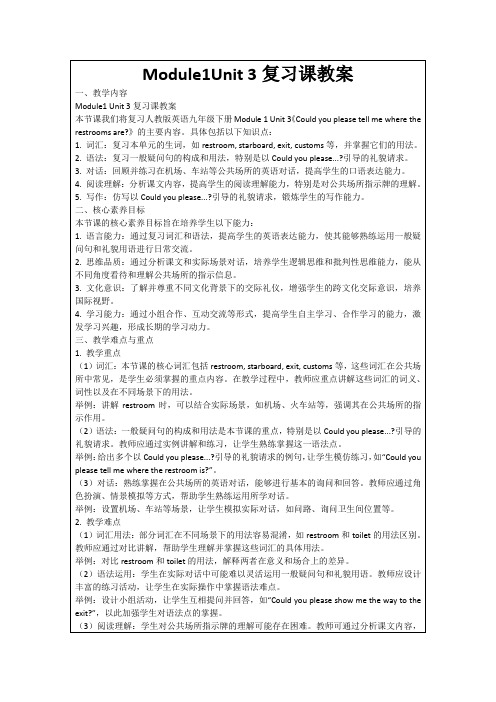
本节课的核心素养目标旨在培养学生以下能力:
1.语言能力:通过复习词汇和语法,提高学生的英语表达能力,使其能够熟练运用一般疑问句和礼貌用语进行日常交流。
2.思维品质:通过分析课文和实际场景对话,培养学生逻辑思维和批判性思维能力,能从不同角度看待和理解公共场所的指示信息。
3.文化意识:了解并尊重不同文化背景下的交际礼仪,增强学生的跨文化交际意识,培养国际视野。
3.成果分享:每个小组将选择一名代表来分享他们的讨论成果和角色扮演的经验。
(五)总结回顾(用时5分钟)
今天的学习,我们复习了一般疑问句的构成、礼貌用语的运用以及在公共场所的英语对话。通过实践活动和小组讨论,我们加深了对这些知识点的理解。我希望大家能够在日常生活中灵活运用所学,提升自己的英语交流能力。如果对今天的内容有任何疑问,欢迎随时向我提问。
2.语法:复习一般疑问句的构成和用法,特别是以Could you please...?引导的礼貌请求。
3.对话:回顾并练习在机场、车站等公共场所的英语对话,提高学生的口语表达能力。
4.阅读理解:分析课文内容,提高学生的阅读理解能力,特别是对公共场所指示牌的理解。
5.写作:仿写以Could you please...?引导的礼貌请求,锻炼学生的写作能力。
4.学习能力:通过小组合作、互动交流等形式,提高学生自主学习、合作学习的能力,激发学习兴趣,形成长期的学习动力。
三、教学难点与重点
1.教学重点
(1)词汇:本节课的核心词汇包括restroom, starboard, exit, customs等,这些词汇在公共场所中常见,是学生必须掌握的重点内容。在教学过程中,教师应重点讲解这些词汇的词义、词性以及在不同场景下的用法。
- 1、下载文档前请自行甄别文档内容的完整性,平台不提供额外的编辑、内容补充、找答案等附加服务。
- 2、"仅部分预览"的文档,不可在线预览部分如存在完整性等问题,可反馈申请退款(可完整预览的文档不适用该条件!)。
- 3、如文档侵犯您的权益,请联系客服反馈,我们会尽快为您处理(人工客服工作时间:9:00-18:30)。
Module 1 Unit 3复习讲义【核心词汇】1.ashamed adj. 羞愧的be ashamed of sth 对…感到惭愧be ashamed to do sth对做某事感到惭愧shame n. 羞耻,羞愧;憾事What a shame! 多可惜,真遗憾!shameful adj. 可耻的,丢脸的2.recover vi. 恢复,康复vt. 重新获得,重新找到recover from….从…中恢复recover from liver failure从肝脏衰竭中康复过来recovery n. 复原,痊愈3.contain vt. 包含,容纳;忍住,抑制contain oneself 克制自己container n. 容器4.damage vt./n. 损害,毁坏damage强调毁坏不够严重还可以修复,而destroy强调毁坏后无法修复cause/do damage to sth对…造成损害5.be embarrassed about对…感到难为情的/尴尬的embarrass vt. 使窘迫,使尴尬,使难为情embarrassing adj. 令人尴尬的/难为情的embarrassment n. 尴尬,令人难堪的事,窘迫6.prefer to do sth宁愿做某事prefer doing to doing 宁愿做….而不愿做…prefer sb to do sth宁愿某人做某事prefer to do sth rather than do sth宁愿做….而不愿做…would prefer to do sth宁愿做某事7.suffer vt. 遭受,蒙受;suffer great loss 遭受重大损失忍受,耐住can’t suffer people’s misunderstanding 无法忍受被误解vi. 受痛苦,患病;变糟suffer from a serious disease遭受严重疾病的煎熬suffer from floods 遭受洪水的肆虐suffering n. 痛苦,折磨8. affect vt. 影响;感动;(疾病)的侵袭effect n. 效果;影响;作用side effect副作用affect = have an effect on …对…产生作用,对…有效果9. comfort n. 安慰;舒适vt 安慰live in comfort生活安逸舒适comfortable adj 舒服的uncomfortable adj不舒服的comfortably adv 舒服地10 .skip (skipped, skipped) vi. 蹦跳着走vt. 跳过,略过11. concentrate vi 集中,全神贯注concentrate on sthconcentrate vt 集中…concentrate …on… sth 把….集中于…concentration n.12. count vi 重要vt 数数,计数;认为;算入count on 依靠=depend on/rely oncount sb/sth as =consider/regard sb/sth as 把…看作【巩固检测】根据汉语提示,完成句子1.To tell you the truth, I ______ ______ _______ (为…感到羞愧的) making the samemistake again.2.Have you ________ (找回) your dictionary?3.It rained heavily for quite a few days, _____________________________ (造成很大损失)to the crops.4.I prefer swimming to _____________________ (打篮球) in such a hot day.5.她正在遭受癌症的折磨。
_____________________________________________.6.我们不应该为体重而感到很尴尬。
________________________________________.7. In my opinion, the fifth lesson is not so important, so you can ________ it.A. jumpB. skipC. missD. lose8. As we all know, every minute________ during the course of a basketball match.A. benefitsB. changesC. countsD. interests9. In my opinion, the fifth lesson is not so important, so you can _____ it.A. jumpB. shipC. missD. lose10. To tell the truth, his bad action ______ my attitude to him.A. affectedB. movedC. workedD. turned11. As we all know, even one minute _____ during the course of a basketball match.A. benefitsB. changesC. countsD. interests12. 刚刚经历了不愉快的事,这孩子需要安慰。
__________________________________________________________________.核心词汇KEY1.am ashamed of2.recovered3.which caused great damage4.playing basketball5.She is suffering from cancer.6.We shouldn’t be ashamed of our weight.7. B. 8. C. 9. B . 10. A. 11. C.12. Having just experienced an unpleasant thing, the child needs to be comforted.【核心短语】1.work out vi. 锻炼;产生某种(好)结果;vt. 计算出;制定出work as…做…..,担任….2.go on a diet=go on diets节食be on a diet在节食3.be dying for sth 渴望得到某物,极想得到某物be dying to do sth 渴望做某事4.be worth a visit值得参观It’s worth it.是值得的。
be worth doing sth值得被….5. fall out (头发等)脱落6. in the long term从长远角度来看in the short term 从短期看,就眼前来说7. get into shape= build up one’s health强身健体8. fall out(头发,纽扣,牙齿等)脱落9. as a matter of fact=in fact=actually事实上10. a car crash撞车11. in the hope of doing sth怀有做某事的希望12. feel energetic感到精力充沛13. deserve to be respected=be worth respecting =deserve respecting值得尊敬14. under treatment在治疗中15. rather than 而不是16. thanks to 幸亏,由于17. fight for/against为….奋斗/同….斗争18. be popular among sb.受…欢迎19. poisonous chemicals有毒的化学物质20. with pleasure十分愿意,非常乐意21. exchange sth with sb与某仍然交换某物22. regret doing sth后悔做了某事regret to do sth 遗憾地要做某事23. have an influence on ..对…有影响24. in no time 立刻25. take/run the risk冒险26. come up出现,发生;走上前来27. end in以…结尾/结果/告终28. prepare sb for sth使某人…做准备29. take/follow one’s advice采纳某人的建议30. stay in shape/keep healthy保持健康【巩固检测】1.If you keep on ________ ________ (锻炼), you are sure to lose weight.2.那女孩说她正在节食,可是医生建议她再也不要节食了。
______________________________________________________________________. 3.____________ _________ away from home for a long time, he _____ _____ to see hisparents. (已经离家很长时间了,他渴望见到父母)4.This problem is of great ___________ (重要) and is worth _____________ (discuss).5.The job needs a lot of hard work, but ____________________________ (值得的)。
6.那条小狗过去常常在我家门口迎接我,可是现在不见了。
________________________________________________________________________.7. In class, we must _________ _________ (集中精力)what the teacher is teaching.8. He looks thirty, but _______ ________ __________ __________ _________(事实上) , he is only twenty-five.9. 他的头发在脱落,这让他很担心。
